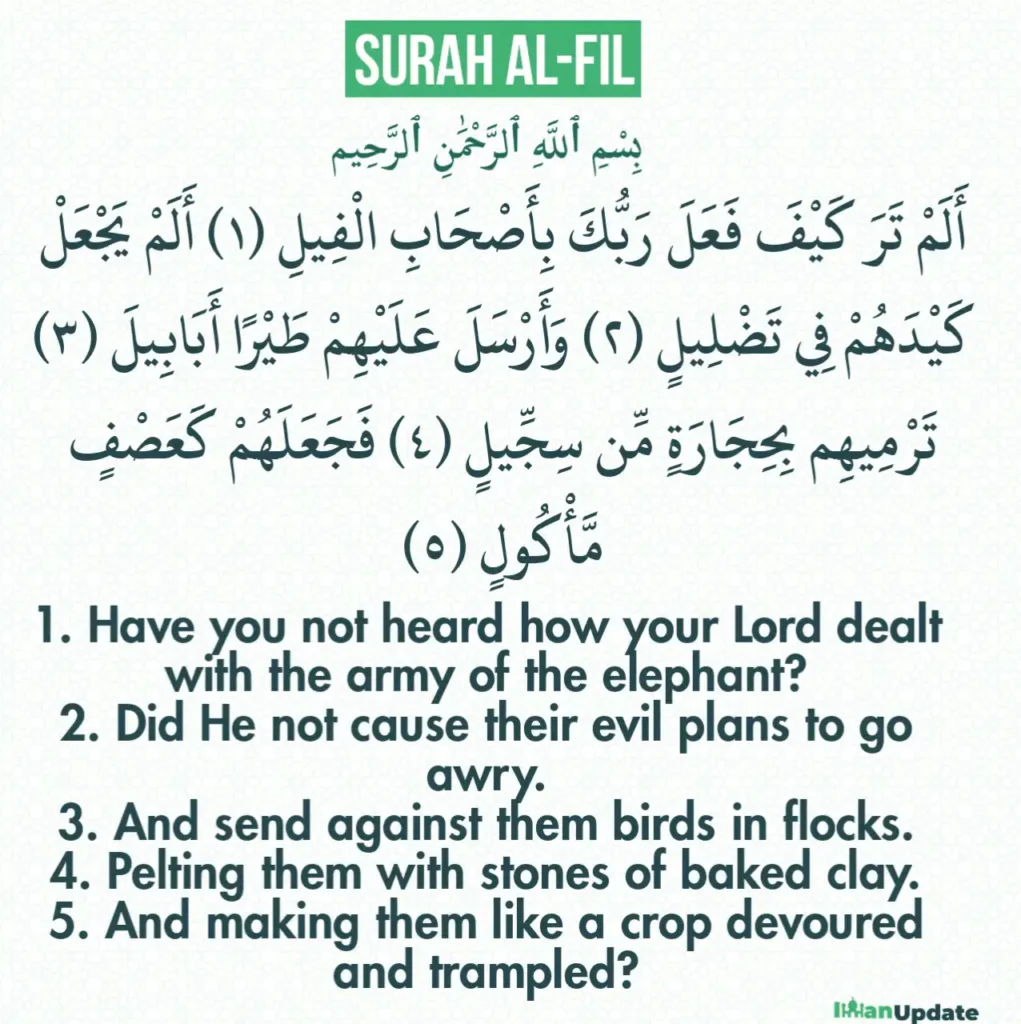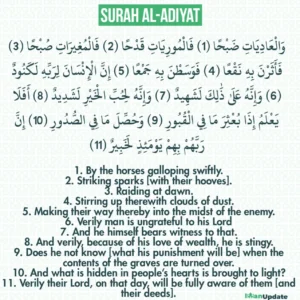Last Ten Surah Of Quran in English, Arabic & Transliteration

The last ten surah of quran talk about important things like being thankful, being kind, believing in one God, the success of Islam and asking Allah for protection.
Each Surah has its own special message. Here is a list of the last 10 Surahs, what they are about, and how many verses they have:
| Surah | Classification | Number of Verses |
|---|---|---|
| Al-Fil (105) | Makki | 5 |
| Quraysh (106) | Makki | 4 |
| Al-Ma’un (107) | Makki | 7 |
| Al-Kawthar (108) | Makki | 3 |
| Al-Kafirun (109) | Makki | 6 |
| An-Nasr (110) | Madani | 3 |
| Al-Masad (111) | Makki | 5 |
| Al-Ikhlas (112) | Makki | 4 |
| Al-Falaq (113) | Makki | 5 |
| An-Nas (114) | Makki | 6 |
Last Ten Surah Of Quran
The last ten Surahs (chapters) of the Quran are as follows:
1. Surah Al-Fil (Chapter 105) – The Elephant
Surah Al-Fil tells the amazing story of how Allah saved the Kaaba from being destroyed.
A man named Abraha brought an army with a big elephant to attack the Kaaba, but Allah sent small birds to drop tiny stones on the army, defeating them and saving the holy place. This Surah reminds us of Allah’s power and protection.
بسم الله الرحمن الرحيم
أَلَمْ تَرَ كَيْفَ فَعَلَ رَبُّكَ بِأَصْحَابِ الْفِيلِ (١) أَلَمْ يَجْعَلْ كَيْدَهُمْ فِي تَضْلِيلٍ (٢) وَأَرْسَلَ عَلَيْهِمْ طَيْرًا أَبَابِيلَ (٣) تَرْمِيهِم بِحِجَارَةٍ مِّن سِجِّيلٍ (٤) فَجَعَلَهُمْ كَعَصْفٍ مَّأْكُولٍ (٥)
Transliteration
- Alam tara kaifa fa’ala Rabbuka bi as habil fil
- Alam yaj’al kaiydahum fii tadleel
- Wa arsala alaiyhim daiyran abaa bil
- Tar meehim bihijaaratin min sijjeel
- Fa ja’alahum ka’asfin ma’akuul
Alam Tara Kaifa Surah in English
- Have you not heard how your Lord dealt with the army of the elephant?
- Did He not cause their evil plans to go awry.
- And send against them birds in flocks.
- Pelting them with stones of baked clay.
- And making them like a crop devoured and trampled?

2. Surah Quraysh (Chapter 106) – Quraish
Surah Quraysh reminds the Quraish tribe of the many blessings and protections they received from Allah. It encourages them to be grateful for these favors, which included:
- Safe passage for trade caravans
- Peace and security in the city of Mecca
- Access to the Kaaba, a sacred place of worship
This Surah teaches us to appreciate and thank Allah for His kindness and generosity.
بِسْمِ اللهِ الرَّحْمٰنِ الرَّحِيْمِ
لِإِيلافِ قُرَيْشٍ (١) إِيلافِهِمْ رِحْلَةَ الشِّتَاءِ وَالصَّيْفِ (٢) فَلْيَعْبُدُوا رَبَّ هَذَا الْبَيْتِ (٣) الَّذِي أَطْعَمَهُم مِّن جُوعٍ وَآمَنَهُم مِّنْ خَوْفٍ (٤)
Transliteration
- Li iylafi Kuraish
- Ilaa fihim rihlatash shitaa i wassaiyf
- Fal ya’abuduu rabba hazal bayt
- Allazi ad’amahum min juu’in wa aa manahum min kauf
Surah in English
- For the blessings [We have bestowed upon] Quraysh.
- The blessing of their regular journeys, winter and summer.
- Let them worship the Lord of this House.
- Who has fed them against hunger and has secured them against fear.

3. Surah Al-Ma’un (Chapter 107) – Almsgiving
Surah Al-Ma’un addresses the importance of small acts of kindness, charity, and helping others in daily life.
بِسْمِ اللهِ الرَّحْمٰنِ الرَّحِيْمِ
أَرَأَيْتَ الَّذِي يُكَذِّبُ بِالدِّينِ (١) فَذَلِكَ الَّذِي يَدُعُّ الْيَتِيمَ (٢) وَلا يَحُضُّ عَلَى طَعَامِ الْمِسْكِينِ (٣) فَوَيْلٌ لِّلْمُصَلِّينَ (٤) الَّذِينَ هُمْ عَن صَلاتِهِمْ سَاهُونَ (٥) الَّذِينَ هُمْ يُرَاؤُونَ (٦) وَيَمْنَعُونَ الْمَاعُونَ (٧)
Transliteration
- Ara aital lazee yu kazzibu bid deen
- Fa zaalikal lazi yadu ul yateem
- Wa la ya huddu alaa ta’amil miskeen
- Fa wai lul lil mu salleen
- Al lazeena hum an salaatihim sahoon
- Al lazeena hum yuraa oon
- Wa yam na oonal ma oon
Surah in English
- Have you seen the one who denies the Last Judgement?
- Such is the one who drives away.
- And does not urge others to feed the needy.
- So woe to those who pray.
- But are heedless regarding their prayer.
- Those who make a show of piety.
- Yet withhold small kindnesses.

4. Surah Al-Kawthar (Chapter 108) – Abundance
Surah Al-Kawthar celebrates the abundance of blessings bestowed upon the Prophet Muhammad, urging gratitude and devotion.
بِسْمِ اللهِ الرَّحْمٰنِ الرَّحِيْمِ
إِنَّا أَعْطَيْنَاكَ الْكَوْثَرَ(1) فَصَلِّ لِرَبِّكَ وَانْحَرْ(2) إِنَّ شَانِئَكَ هُوَ الْأَبْتَ (3)
Transliteration
- Inna a’a’daina kal kausar.
- Fa salli Lirabbika wan har.
- Ina sha’ani aka huwwal abtar.
Translation in English
- Indeed, We have granted you al-Kawthar.
- So pray to your Lord and offer sacrifice.
- Indeed, your enemy is the one cut off.

5. Surah Al-Kafirun (Chapter 109) – The Disbelievers
Surah Al-Kafirun conveys the clear distinction between the beliefs of Muslims and disbelievers, emphasizing the rejection of polytheism.
بِسْمِ اللهِ الرَّحْمٰنِ الرَّحِيْمِ
قُلۡ يَٰٓأَيُّهَا ٱلۡكَٰفِرُونَ (١) لَآ أَعۡبُدُ مَا تَعۡبُدُون (٢) وَلَآ أَنتُمۡ عَٰبِدُونَ مَآ أَعۡبُدُ (٣) وَلَآ أَنَا۠ عَابِدٌ مَّا عَبَدتُّمۡ (٤) وَلَآ أَنتُمۡ عَٰبِدُونَ مَآ أَعۡبُدُ (٥) لَكُمۡ دِينُكُمۡ وَلِىَ دِينِ (٦)
Transliteration
- Qul ya ayyuhal kafirun
- Laa a’abudu maa ta’a budun
- Wa laa antum a biduna maa a’abudu
- Wa laa ana aabidun ma abadtum
- Wa laa antum a biduna maa a’abudu
- Lakum diynukum waliyaddiyn
Surah in English
- Say, “O disbelievers.
- I do not worship what you worship.
- Nor are you worshippers of what I worship.
- Nor will I be a worshipper of what you worship.
- Nor will you be worshippers of what I worship.
- For you is your religion, and for me is my religion.

6. Surah An-Nasr (Chapter 110) – Divine Support
Surah An-Nasr announces the imminent victory and success of Islam, encouraging believers to seek forgiveness and praise Allah.
بِسْمِ اللهِ الرَّحْمٰنِ الرَّحِيْمِ
إِذَا جَاءَ نَصْرُ اللَّهِ وَالْفَتْحُ (١) وَرَأَيْتَ النَّاسَ يَدْخُلُونَ فِي دِينِ اللَّهِ أَفْوَاجًا (٢) فَسَبِّحْ بِحَمْدِ رَبِّكَ وَاسْتَغْفِرْهُ إِنَّهُ كَانَ تَوَّابًا (٣)
Transliteration
- Izaa jaa a nasrul Lahi wal fath.
- Wa raaytan nasa yadkuluna fii deenil Lahi afwajaa.
- Fasabih bi hamdi Rabbika was tagfirhu innahu kana tawwabaa.
Translation in English
- When Allah’s help and victory come.
- And you see people entering Allah’s religion in multitudes.
- Glorify and praise your Lord, and seek His forgiveness; verily He is ever Accepting of repentance.

7. Surah Al-Masad (Chapter 111) – Palm Fiber
Surah Al-Masad condemns Abu Lahab and his wife for their opposition to Islam, warning of the consequences they will face.
بِسْمِ اللهِ الرَّحْمٰنِ الرَّحِيْمِ
تَبَّتۡ يَدَآ أَبِي لَهَبٖ وَتَبَّ (1) مَآ أَغۡنَىٰ عَنۡهُ مَالُهُۥ وَمَا كَسَبَ (2) سَيَصۡلَىٰ نَارٗا ذَاتَ لَهَبٖ (3) وَٱمۡرَأَتُهُۥ حَمَّالَةَ ٱلۡحَطَبِ (4) فِي جِيدِهَا حَبۡلٞ مِّن مَّسَدِۭ (5)
Transliteration
Bismillaahir Rahmaanir Raheem
- Tabbat yadaa abee Lahabinw-wa tabb
- Maa aghnaa ‘anhu maaluhoo wa ma kasab
- Sa-yaslaa naaran zaata lahab
- Wamra-atuhoo hammaa latal-hatab
- Fee jeedihaa hablum mim-masad
Tabbat Surah in English
- May the hands of Abu Lahab perish, and may he perish.
- Neither his wealth nor his gains will avail him.
- He will bum in a blazing fire.
- And so will his wife, the carrier of firewood.
- On her neck will be a rope of palm fibres.

8. Surah Al-Ikhlas (Chapter 112) – Sincerity
Surah Al-Ikhlas affirms the oneness and uniqueness of Allah, emphasizing that He is beyond comparison and has no partners.
بِسْمِ اللهِ الرَّحْمٰنِ الرَّحِيْمِ
قُلْ هُوَ اللَّهُ أَحَدٌ (١) اللَّهُ الصَّمَدُ (٢) لَمْ يَلِدْ وَلَمْ يُولَدْ (٣) وَلَمْ يَكُن لَّهُ كُفُوًا أَحَدٌ (٤)
Transliteration
- Qul huwal Lahul
- Ahad Allahus Samad
- Lam yalid walam yuulad
- Walam yakun lahu qufwan Ahad.
Surah in English
- Say: He, Allah, is One.
- Allah, Who is sought by all.
- He begets not nor was He begotten
- And there is none comparable to Him.

9. Surah Al-Falaq (Chapter 113) – Daybreak
Surah Al-Falaq seeks refuge in Allah from the evils of the night, emphasizing dependence on Him for protection from harm.
بِسْمِ اللهِ الرَّحْمٰنِ الرَّحِيْمِ
قُلْ أَعُوذُ بِرَبِّ الْفَلَقِ (١) مِن شَرِّ مَا خَلَقَ (٢) وَمِن شَرِّ غَاسِقٍ إِذَا وَقَبَ (٣) وَمِن شَرِّ النَّفَّاثَاتِ فِي الْعُقَدِ (٤) وَمِن شَرِّ حَاسِدٍ إِذَا حَسَدَ (٥)
Transliteration
- Qul a’oozu bi rabbil-falaq
- Min sharri maa khalaq
- Wa min sharri ghaasiqin izaa waqab
- Wa min sharrin-naffaa-saati fil ‘uqad
- Wa min sharri haasidin izaa hasad
Meaning in English
- Say, “I seek refuge in the Lord of daybreak.
- From the evil of what He created.
- And from the evil of darkness when it settles.
- And from the evil of the blowers in knots.
- And from the evil of an envier when he envies.

10. Surah An-Nas (Chapter 114) – Mankind
Surah An-Nas seeks refuge in Allah from the whispers of Satan and his influence, emphasizing reliance on Allah for guidance and protection.
بِسْمِ اللهِ الرَّحْمٰنِ الرَّحِيْمِ
قُلْ أَعُوذُ بِرَبِّ النَّاسِ (١) مَلِكِ النَّاسِ (٢) إِلَهِ النَّاسِ (٣) مِن شَرِّ الْوَسْوَاسِ الْخَنَّاسِ (٤) الَّذِي يُوَسْوِسُ فِي صُدُورِ النَّاسِ (٥) مِنَ الْجِنَّةِ وَالنَّاسِ (٦)
Transliteration
- Qul auzo bi Rabbin Nass
- Malikin Nass
- Ilahin Nass
- Min Sharril was waasil kannass
- Allazi yu was wiyus fi sudurin Nass
- Minal jinnati wannass
Surah in English
- Say: I seek refuge with the Lord of humankind.
- The Sovereign of humankind.
- The God of humankind.
- From the harm [and mischief] of the insidious whisperer.
- Who whispers into the hearts of humankind.
- From among the jinn and humankind.







